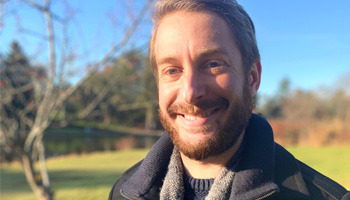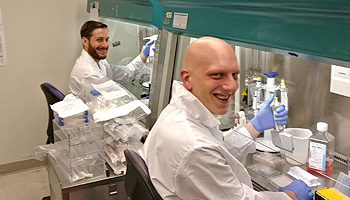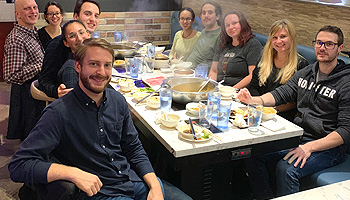HOW CAN WE HELP YOU? Call 1-800-TRY-CHOP
In This Section
Faculty Spotlight: ‘There is no one path in science.’ Q&A With Will Bailis, PhD

Our June featured Faculty Spotlight, Will Bailis, PhD.
Editor’s Note: This Q&A is the sixth in a series of monthly Cornerstone stories, in which we sit down with faculty members at Children’s Hospital of Philadelphia Research Institutes to learn more about their research and roles. Through these spotlights, our readers have the opportunity to meet the diverse, dedicated, and distinctive individuals who lead our research community in our mission to improve children’s health. In this Q&A, we feature Will Bailis, PhD, assistant professor of Pathology and Laboratory Medicine. At June’s virtual Faculty Luncheon, Dr. Bailis will present a session titled “The Multifaceted Role of NAD Metabolism in T Cell Activation.” Meet more folks from the Bailis Lab on Instagram.
How long have you been at CHOP, and can you fill us in about your research specialty?

The Bailis Lab officially opened its doors at CHOP in January 2019, and it studies the ways metabolism and nutrition underlie immunology and human health. Growing up next door to Philly and having been a PhD student myself at Penn, it feels incredibly special to be back in the area and training students in my own lab. It is a real privilege and honor to rejoin such a collegial and collaborative research community.
Within biology, we often think about how cells behave as being controlled by the genes they turn on and off. In that light, we tend to understand differences in people’s health as being influenced by differences in our genomes or the genes the cells in our bodies choose to make. To that end, many therapies we use to treat disease are focused on changing how our cells talk to their genome, or more recently, correcting genetic errors.
My lab tries to see things through a slightly different lens: The genes our cells make certainly matter, but in order for them to work at all, they need to be in the right environment. We all know this rather intuitively, too. You can’t make a cell grow in alcohol or acid or even pure water for that matter. This is because the cells we are composed of are just big bags of chemicals themselves. The chemistry that exists around them and inside them is the world cells live in and experience. Chemistry is the ultimate biological mechanism, and what creates the chemistry of life is metabolism.

Why did you choose to focus on that specialty?
My passion for science always has been learning what the central mechanisms in biology really are. When you understand the root cause of a disease, you can design therapies that target the source rather than symptoms and hopefully find a cure. If you keep zooming in, what you’re left with in biology is chemistry.
So what creates the chemistry of our cells? The food we eat and metabolism (the way the cells in our body process nutrients). When you begin to look at biology this way, you begin to appreciate that everything inside a cell comes from somewhere: There are processes that create that “stuff” from what we put in our mouths, and where that stuff physically is within our cells and our bodies matters as much as anything else. DNA, RNA, and protein — the molecules that govern the life of a gene — are all simply polymers of metabolites. The things that turn genes off and on (epigenetic marks) are just metabolites stuck onto our genome. In this way, metabolism and metabolites are the fundamental units of biological information.
A lot of work has been done in other fields (like cancer biology) to understand how diet and metabolism influence cell behavior. Immunology has only just started to understand the real mechanisms of how this happens inside immune cells. In the Bailis Lab, we want to learn how the chemistry of cells and animals fits in with what we already know about genes and gene regulation in the immune system, so we can better understand how human health works.

Tell us about a current or recent research project (or projects) that you are excited about?
I am excited about all the projects we have going on in the lab, but I can highlight one we have been building momentum on that shows off what makes CHOP such an amazing place to do science.
Every one of us is born with small (and sometimes large) mutations all over our genome that help make us different. Sometimes those mutations can disrupt important genes and make people sick. When that happens to genes that affect metabolism, it can cause what we call an inborn error of metabolism (IEM).
Since IEM can cause big developmental and systemic issues, they often aren’t looked at in terms of their immunology. However, we now know metabolism is an essential part of how the immune system works, and many IEM patients get infections more often, get sicker, and stay sick longer than most other people. We have started a collaboration with Drs. Rebecca Ahrens-Nicklas and Sarah Henrickson at CHOP to study the immunology of IEM and other monogenic diseases.
To do so, we are working to build a research pipeline that consists of:
- comprehensive immune profiling of patient blood, using methods the Henrickson Lab has expertise in
- using CRISPR/Cas9 techniques we have developed in the Bailis Lab to model how patient mutations affect primary human immune cells and the outcome of infection in mouse models.
We’re excited to see what this approach will teach us about the health of the immune system in these children, in order to improve their care, as well as the basic scientific insights it will give us into how metabolism can be used to control human immune responses. In the future, we hope that the success of this pipeline can help other physicians and scientists at CHOP figure out whether given mutations found in patients are the cause of immune dysfunction seen in them.
What are the long-term research questions you hope to answer?
Long-term, we hope that the mechanistic insights we gain from our research can be used to develop metabolite and diet-based therapies for treating immune-related diseases that are lower cost and higher access than traditional therapies. Scientifically, we are currently pursuing the following research topics:
- how cellular metabolic changes that occur early after lymphocyte activation pattern immune responses
- the extent to which changes in metabolic environment are sensed and processed by immune cells at the level of epigenetics, transcription, and translation
- the ways intracellular pathogen infection rewires metabolism to alter innate immune cell programming
- how inborn errors of metabolism impact the immune system.
Can you share any words of advice to young scientists or students who aspire to become scientists like yourself?
Science can be fun, exciting, and transformative, but it also can feel like an uphill climb at every step. It is so important to find a support structure you can rely on, be it mentors, colleagues, friends, family, or a loving pet.
Right alongside that is knowing what you want to get out of your training experience and using that to empower yourself. There is no one path in science. As freeing as that is, it can be equally daunting. Try to be honest with yourself about which aspects of science inspire you, what type of research you enjoy doing, the way you feel fulfilled doing work.
Some people like to run science like it’s a marathon, working until they drop. Others prefer to take time to think, read, and plan with a steady pace of experiments in between. Whatever way you find internal and external success, try to seek a research field and lab that aligns with who you are.
The final part of the equation is learning how to ask the best questions. Data can be generated by anyone who puts enough time and effort into research. Knowing which questions that data answers and how to frame that around exciting scientific or medical problems is what elevates a good experiment into an influential study.


